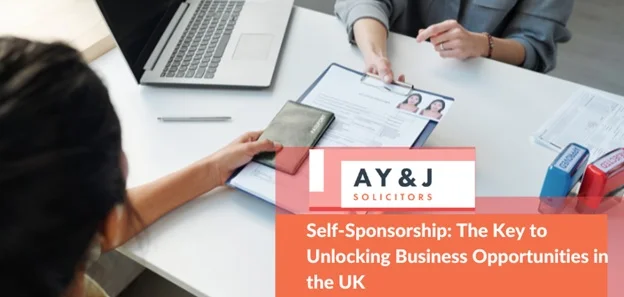If you are a business owner who wants to expand your business into an international market, having a business visa UK via a UK Self-Sponsorship visa is your best option.
The UK Self-Sponsorship visa route is a pathway for ambitious business owners like you who want to take control of their business while also establishing a business in the UK.
What is the UK Self-Sponsorship visa and why should you choose it?
The UK Self-Sponsorship visa route allows foreign entrepreneurs who want to start a business or expand their business in the UK without depending on a traditional way of getting sponsored.
Under this route, you need to take care of two things, getting a Skilled worker visa and a Sponsor licence. An entrepreneur needs to get a skilled worker visa under his/her own business which can issue a Sponsor Licence.
You need to be eligible according to the below criteria for sponsoring yourself for a skilled worker visa.
- You should be at least 18 years of age.
- You have submitted a valid TB certificate (in case it is required).
- In case you already have a business in the UK, it must be a working (trading) and authentic business.
- Your established business must have or applied for a Skilled Worker Sponsor Licence.
- The company must be assigned a valid CoS (Certificate of sponsorship).
- Your skill levels must match with the job you are getting in the company.
- You will receive a wage that is at least as much as the usual “going rate” for your specific SOC 2020 occupation category as well as the general pay threshold.
- You have at least CEFR Level B1( equal to IELTS 4.0).
- You are financially able to support yourself and not rely on public funds.
- If needed, you must be able to present a criminal record certificate.
Additionally, the actual requirements also depend upon your circumstances.
Getting started with a UK Self-Sponsorship visa
Although there are very detailed steps to get the visa under the Self-Sponsorship route but here are some important steps:
- Incorporation of a business in the UK
The very first step to getting started is to either have an already registered company in the UK or register a new company in the UK. In case you plan to register a company in the UK, you can do so from overseas as well. There are no requirements for the director to be a UK resident but must meet certain obligations as required. The process of incorporating a business in the UK can be very lengthy and detailed. Seek guidance from us today! From choosing a company structure to submitting documents to companies, we can help you at every step in registering a company in the UK.
- Apply for a Skilled Worker Sponsor Licence
After registering your company in the UK, the next step involves applying for a Skilled Worker sponsorship licence.
To do so, you need to satisfy the home office regarding the following:
- Your UK business must operate lawfully and have genuine business intent.
The home office can demand certain documents depending on the situation of your application to prove that you are opening a lawful business. Each case is very different, and so is the requirement of documentation.
You can find a list of all the documents here.
- The business must efficiently perform its sponsor duties.
Being a licenced sponsor comes with responsibilities and compliance that you must follow and fulfill. As a licenced sponsor, the following come under your duties:
- Keeping a record of duties
- Maintaining documents related to duties
- Keeping a check on UK immigration regulations
The home office examines your recruitment processes. For example, they can check what procedures you follow in case a sponsored person does not show up for work or when their license has expired or will be expired. A compliance audit can also be conducted either at the time of deciding the status of your application or after granting your licence.
- The job for which you are getting a skilled worker visa must be genuine and the pay must match your skill level.
Apart from checking the records of your business, the Home office would also check if the UK company will offer you the job according to your skill level requirement under the Skilled Worker Visa. They will also check if your decided salary meets the threshold limits that the Government sets. The Home Office would also be interested in knowing about the genuineness of the job requirement and that the sponsoring company and employee have a direct employer-employee relationship.
- Assigning the CoS Certificate of Sponsorship
Once your company’s sponsor licence is approved, you will be able to apply for a Certificate of Sponsorship. Each overseas worker you hire must have the above-mentioned certificate. The CoS will have a distinguished reference number, which allows the worker to apply for a skilled worker visa by sponsoring yourself. The certificate must be issued for not more than 3 months from the date of application for a skilled worker visa.
To sum up:
Going through the process of getting the UK Self Sponsorship visa, seems easy but it can become difficult without an expert’s support. At A Y & J Solicitors, we have helped more than 4000 individuals and seasoned leaders to establish their business in the UK and get a self-sponsored visa. Our Self-Sponsorship Visa route experts will help you determine the best approach for successful application. By having us by your side, you can start your business with ease; gain peace of mind, avoid visa refusals and get access to 24/7 support (even post-approval). Let our lawyers take the burden off your shoulders so that you can do what you are good at, making a flourishing business in the UK.
If you find this article helpful, click here for more.









